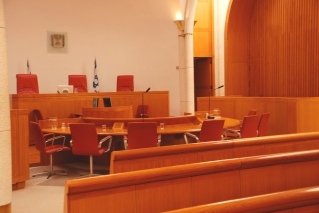 The Supreme Court, photo by Melanie Takefman
The Supreme Court, photo by Melanie TakefmanThe High Court of Justice has issued an Order Nisi following two separate petitions filed against the Acceptance to Communities Law, and required the government and the Knesset State to explain within 60 days why this law should not be disqualified on the grounds that it is unconstitutional. The petitions will be brought before an extended panel of nine High Court Justices.
Today (20 June 2011), the High Court Justices Beinisch, Arbel, and Danziger presided over a hearing regarding two separate petitions against the Acceptance to Communities Law – one filed by the Association for Civil Rights in Israel (ACRI) together with the Abraham Fund Initiatives and Atid Misgav; and the other filed by Adalah. The High Court rejected the State’s claim that the petitions should be automatically rejected in order to allow an examination of the law in practice.
In the petition, ACRI Attorney Gil Gan-Mor notes that despite their title, in the majority of these communal villages life is not “communal” and they have no unique characteristics; and yet the law will enable discrimination in acceptance to these villages based on the vague criteria of “fitting with the life of the community” or “fitting with the social fabric.” Based on these criteria, the committees reject “unwanted” communities that wish to live in the village – such as Arabs, single parents, disabled persons, same-sex couples, Mizrachi Jews, religious people, and so on. The petition also included quotes by Members of Knesset who promoted this law, headed by MK David Rotem (Yisrael Beitenu), stating that the law is intended to limit the residency in these communal villages for Jews only.
The petition also examines previous petitions filed to the HCJ by applicants who were rejected from such communal villages, among them the family of a disabled IDF veteran, Arab families, a family of immigrants, and a family of Mizrachi Jews. There are currently two standing petitions before the HCJ, filed by families who were rejected from such villages for “not socially fitting.” These couples are Ahuva and David Kempler, who wanted to live in the expansion of the Kibbutz Maayan Baruch; and Fathna and Ahmad Zbidat, who wanted to live in Rakefet. In the last hearing on this matter at the High Court of Justice, President Dorit Beinisch voiced harsh criticism on these acceptance committees and the intrusive interrogations they entail.
Following the court’s decision, ACRI Attorney Gil Gan-Mor stated: “The High Court will have to rule whether the desire of certain communities to be ‘gated communities’ and to reject those who are not to their liking can overcome the right of Israeli citizens to live where they so wish and their right to dignity and equality. The acceptance communities have been humiliating and discriminating against people for many years, and this new law not only doesn’t limit the harm but actually significantly enhances it. This law provides an unjustifiable license to discriminate against a person only because he or she is different from other members of the village.”
The Abraham Fund Initiatives stated that: “The Acceptance to Communities Law institutionalizes the possibility of segregation between Israeli citizens on the basis of ethnicity or nationality. This was the true intention of some of the promoters of this law, as is evident from MK Rotem’s statements.”
To read ACRI’s full position on this law, click here.







